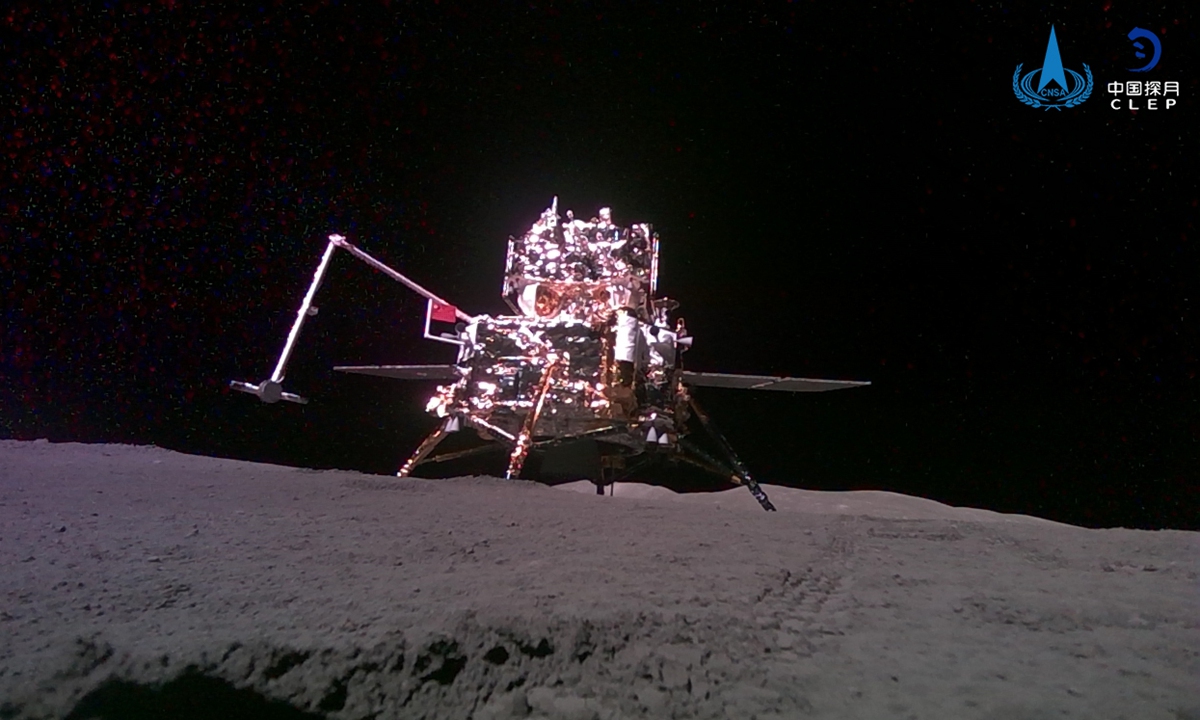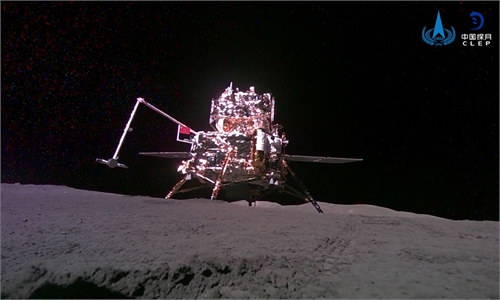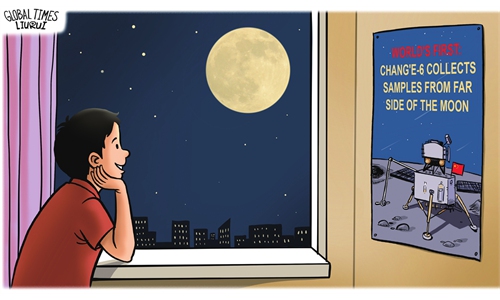China spacecraft Chang'e-6 first to collect samples from far side of the moon - BBC News
A picture of the Chang'e-6 lunar probe's lander and ascender vehicles on the surface of far side of moon taken by a mobile camera on June 3, 2024 Photo: Courtesy of the CNSA
Two days after lifting off from the moon's surface, the ascender of China's Chang'e-6 lunar probe completed a rendezvous and docking with the orbiter-returner combination, delivering the world's first lunar samples collected from the far side of the moon to the Earth-returning vehicle on Thursday afternoon.The Global Times learned from the China National Space Administration (CNSA) on Thursday that the rendezvous and docking took place at 2:48 pm Thursday and the safe transferring of lunar samples at 3:24 pm. This marks the second time China has achieved a lunar orbit rendezvous and docking, following Chang'e-5.
After its epic lift-off from the far side of the moon on Tuesday morning, the ascender of Chang'e-6, carrying the lunar samples, entered the lunar orbit and carried out four orbit adjustments, per the CNSA.
When the ascender was about 50 kilometers ahead and 10 kilometers above the orbiter-returner combination, the orbiter andreturner combination used close-range autonomous control to gradually approach the ascender, completing the orbital rendezvous, according to mission insiders.
The orbiter's three sets of K-shaped grappling claws aligned with the three connecting rods on the ascender's docking surface, securely connecting the two devices by tightening the claws, precisely completing the docking.
After that, the container holding the precious samples from the far side of the moon was safely transferred from the ascender to the returner.
The Chang'e 6 orbiter and returner combination will next separate from the ascender and enter a lunar orbit waiting phase, preparing for a lunar-to-Earth transfer orbit control at an opportune time, according to the mission plan.
After undergoing key steps such as the lunar-to-Earth transfer and the separation of the orbiter and returner, the returner is scheduled to land with the lunar samples at the Siziwang Banner landing site in North China's Inner Mongolia Autonomous Region.
Open to cooperation with US
Chang'e-6 completed the world's first-ever mission of collecting samples from the far side of the moon and is on its way home. This is a historic step in humanity's peaceful use of space, Chinese Foreign Ministry Spokesperson Mao Ning said during a routine press conference on Thursday.
When commenting on reports of NASA's congratulations on the latest leap in China's decades-long moon exploration, Mao told the Global Times on Thursday that China is always open toward space exchanges and cooperation with the US.
The two sides established mechanisms such as the working group on Earth science and space science cooperation, and the China-US Civil Space Dialogue. At US request, the competent authorities of the two countries established a mechanism to exchange orbit data on each other's Mars probes to ensure long-term successful mission operation, according to the spokesperson.
There are, however, difficulties in China-US space cooperation at the moment, which are caused by US domestic legislation such as the Wolf Amendment that prevents normal exchanges and dialogue between Chinese and US space agencies, Mao said.
"If the US truly wants to push forward space exchanges and cooperation with China, it needs to take practical steps to remove these obstacles," Mao noted.
The achievements of China's ongoing Chang'e-6 moon probe mission thus far have evidently become a source of anxiety for the US amid the Western media's fabricated hot saga of the US-China space race, Chinese space observers said on Thursday.
When covering the ascender of Chang'e-6's lift-off from moon surface, US media outlet CNN reported on Tuesday that the successful return of the samples would give China a head start in harnessing the strategic and scientific benefits of expanded lunar exploration - an increasingly competitive field that has contributed to what NASA chief Bill Nelson calls a new "space race."
When asked which country would be the first to have a base on the moon, Keith Cowing, former American rocket scientist and current editor of NASAWatch.com, bluntly said that it might be China. "We (the US) are trying to get there first… but we will land next to them (China), roll down our window and say 'Hi, y'all, where do you want us to park our big lander'."
During the same interview with DW, David Ariosto, an American journalist and founder of Space Watch Daily, said that China has the edge at this point, but that could change.
The anxiety and sour grapes mentality are quite evident on the US side, Li Haidong, a professor at the China Foreign Affairs University, told the Global Times on Thursday.
When handling ties with China, the US is desperate to hold an absolute edge over China in all spheres including the space domain to deal with China's rapid development. The obstacles are rooted in this mentality, Li noted. "Strategically, the US is also unwilling to be on an equal footing with China in space. This mind-set is deeply ingrained and traditional, making it difficult to change. This is also an important factor."
US media and the head of NASA have repeatedly tried to stir up the US-China space race narrative, aiming to increase investment in the space sector and accelerating technological progress and related activities in space, Chinese observers said.
The US wants to create a scenario of mutual confrontation rather than cooperation, which has led to the so-called space race the US desires. However, at present, the conditions for such a race do not exist because China and other countries are not willing to participate. If only the US is invested in it, it can't be called a race. In the end, it becomes a one-sided effort by the US, they said.
RELATED ARTICLES





No comments:
Post a Comment
rightwaystosuccess@gmail.com